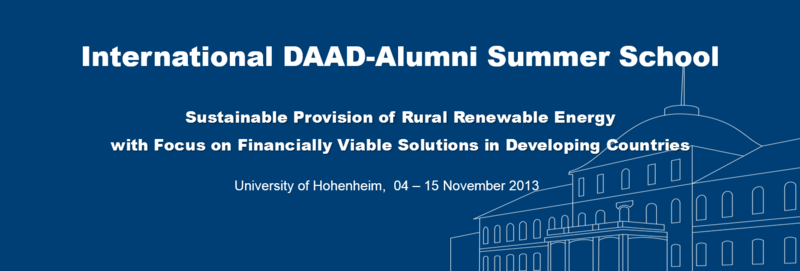Knowledge fuels change - Support energypedia!
For over 10 years, energypedia has been connecting energy experts around the world — helping them share knowledge, learn from each other, and accelerate the global energy transition.
Today, we ask for your support to keep this platform free and accessible to all.
Even a small contribution makes a big difference! If just 10–20% of our 60,000+ monthly visitors donated the equivalent of a cup of coffee — €5 — Energypedia would be fully funded for a whole year.
Is the knowledge you’ve gained through Energypedia this year worth €5 or more?
Your donation keeps the platform running, helps us create new knowledge products, and contributes directly to achieving SDG 7.
Thank you for your support, your donation, big or small, truly matters!
Difference between revisions of "International DAAD-Alumni Summer School - Sustainable Provision of Rural Renewable Energy with Focus on Financially Viable Solutions in Developing Countries"
***** (***** | *****) |
***** (***** | *****) |
||
| Line 20: | Line 20: | ||
= About = | = About = | ||
| − | The International <span data-scaytid=" | + | The International <span data-scaytid="1" data-scayt_word="DAAD-Alumni">DAAD-Alumni</span> Summer School - Sustainable Provision of Rural Renewable Energy with Focus on Financially Viable Solutions in Developing Countries is <span data-scaytid="2" data-scayt_word="organised">organised</span> and hosted by the Center for Agriculture in the Tropics and Subtropics of the University of <span data-scaytid="3" data-scayt_word="Hohenheim">Hohenheim</span> with financial support from the German Academic Exchange Service (<span data-scaytid="4" data-scayt_word="DAAD">DAAD</span>). |
The summer school is an opportunity to get together students, visiting scientists of German universities or former employees of German companies coming from developing countries to exchange knowledge and experience about current issues of rural energy provision in the participating countries. | The summer school is an opportunity to get together students, visiting scientists of German universities or former employees of German companies coming from developing countries to exchange knowledge and experience about current issues of rural energy provision in the participating countries. | ||
| − | The results of the Summer School consist of concrete energy concepts for rural “energy villages” which will be presented at the <span data-scaytid=" | + | The results of the Summer School consist of concrete energy concepts for rural “energy villages” which will be presented at the <span data-scaytid="5" data-scayt_word="Agritechnica">Agritechnica</span> Trade Fair. A social and cultural program provides additional space for networking and discussions about future research cooperation. |
The main topics of the summer school are: | The main topics of the summer school are: | ||
| Line 31: | Line 31: | ||
*Interdependencies of water, food and energy in the light of demographic developments | *Interdependencies of water, food and energy in the light of demographic developments | ||
*Crop production within the water cycle | *Crop production within the water cycle | ||
| − | *Land use planning and <span data-scaytid=" | + | *Land use planning and <span data-scaytid="8" data-scayt_word="modelling">modelling</span> |
*Watershed management | *Watershed management | ||
*Use of waste water | *Use of waste water | ||
| Line 41: | Line 41: | ||
__NOTITLE__ | __NOTITLE__ | ||
| − | [[Category: | + | [[Category:Energy_Access]] |
| + | [[Category:University]] | ||
| + | [[Category:Millennium_Development_Goals_(MDGs)]] | ||
| + | [[Category:Rural_Electrification]] | ||
| + | [[Category:Rural_Development]] | ||
[[Category:Renewable_Energy_(General)]] | [[Category:Renewable_Energy_(General)]] | ||
| − | |||
| − | |||
| − | |||
| − | |||
| − | |||
| − | |||
Revision as of 11:28, 3 November 2013
About
The International DAAD-Alumni Summer School - Sustainable Provision of Rural Renewable Energy with Focus on Financially Viable Solutions in Developing Countries is organised and hosted by the Center for Agriculture in the Tropics and Subtropics of the University of Hohenheim with financial support from the German Academic Exchange Service (DAAD).
The summer school is an opportunity to get together students, visiting scientists of German universities or former employees of German companies coming from developing countries to exchange knowledge and experience about current issues of rural energy provision in the participating countries.
The results of the Summer School consist of concrete energy concepts for rural “energy villages” which will be presented at the Agritechnica Trade Fair. A social and cultural program provides additional space for networking and discussions about future research cooperation.
The main topics of the summer school are:
- Natural resource use, food security and poverty alleviation
- Water resource management
- Interdependencies of water, food and energy in the light of demographic developments
- Crop production within the water cycle
- Land use planning and modelling
- Watershed management
- Use of waste water
- Resource efficient agricultural production





















